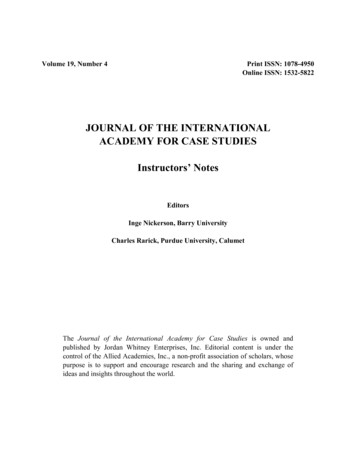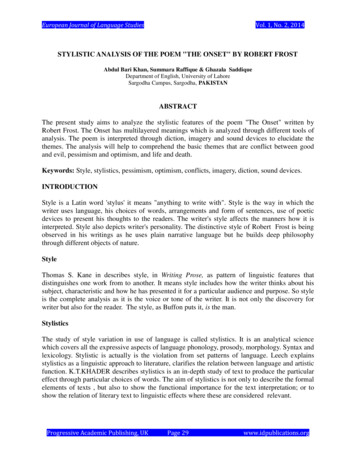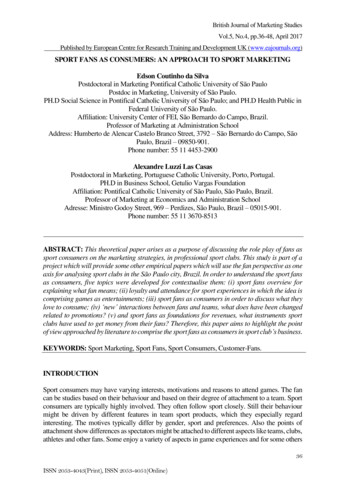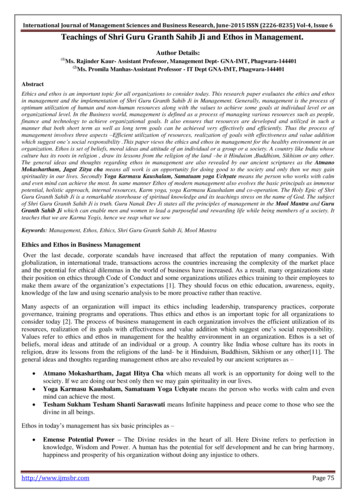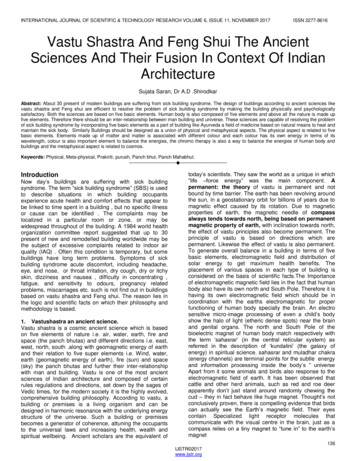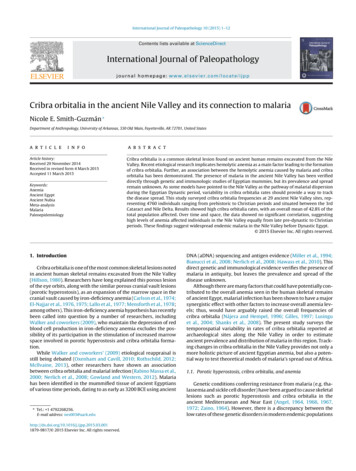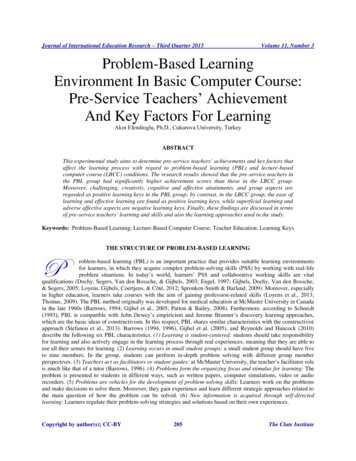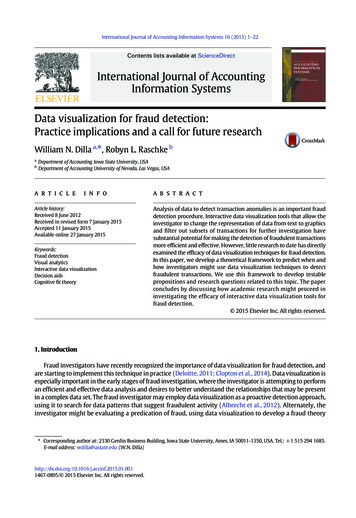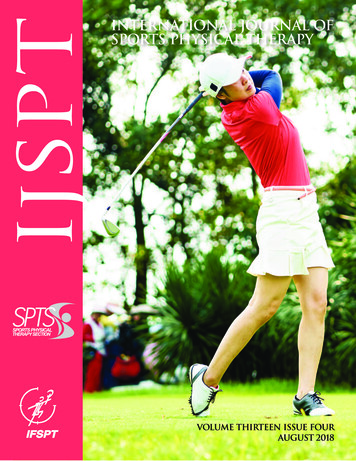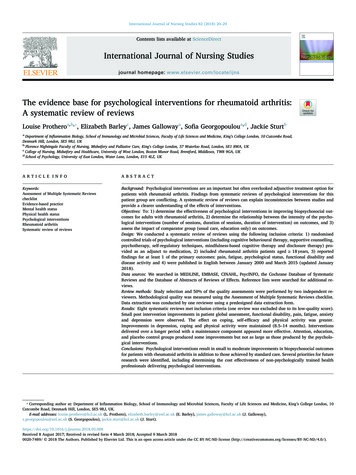
Transcription
International Journal of Nursing Studies 82 (2018) 20–29Contents lists available at ScienceDirectInternational Journal of Nursing Studiesjournal homepage: www.elsevier.com/locate/ijnsThe evidence base for psychological interventions for rheumatoid arthritis:A systematic review of reviewsT⁎Louise Protheroa,b, , Elizabeth Barleyc, James Gallowaya, Sofia Georgopouloua,d, Jackie SturtbaDepartment of Inflammation Biology, School of Immunology and Microbial Sciences, Faculty of Life Sciences and Medicine, King’s College London, 10 Cutcombe Road,Denmark Hill, London, SE5 9RJ, UKbFlorence Nightingale Faculty of Nursing, Midwifery and Palliative Care, King’s College London, 57 Waterloo Road, London, SE1 8WA, UKcCollege of Nursing, Midwifery and Healthcare, University of West London, Boston Manor Road, Brentford, Middlesex, TW8 9GA, UKdSchool of Psychology, University of East London, Water Lane, London, E15 4LZ, UKA R T I C LE I N FOA B S T R A C TKeywords:Assessment of Multiple Systematic ReviewschecklistEvidence-based practiceMental health statusPhysical health statusPsychological interventionsRheumatoid arthritisSystematic review of reviewsBackground: Psychological interventions are an important but often overlooked adjunctive treatment option forpatients with rheumatoid arthritis. Findings from systematic reviews of psychological interventions for thispatient group are conflicting. A systematic review of reviews can explain inconsistencies between studies andprovide a clearer understanding of the effects of interventions.Objectives: To: 1) determine the effectiveness of psychological interventions in improving biopsychosocial outcomes for adults with rheumatoid arthritis, 2) determine the relationship between the intensity of the psychological interventions (number of sessions, duration of sessions, duration of intervention) on outcomes, and 3)assess the impact of comparator group (usual care, education only) on outcomes.Design: We conducted a systematic review of reviews using the following inclusion criteria: 1) randomisedcontrolled trials of psychological interventions (including cognitive behavioural therapy, supportive counselling,psychotherapy, self-regulatory techniques, mindfulness-based cognitive therapy and disclosure therapy) provided as an adjunct to medication, 2) included rheumatoid arthritis patients aged 18 years, 3) reportedfindings for at least 1 of the primary outcomes: pain, fatigue, psychological status, functional disability anddisease activity and 4) were published in English between January 2000 and March 2015 (updated January2018).Data sources: We searched in MEDLINE, EMBASE, CINAHL, PsycINFO, the Cochrane Database of SystematicReviews and the Database of Abstracts of Reviews of Effects. Reference lists were searched for additional reviews.Review methods: Study selection and 50% of the quality assessments were performed by two independent reviewers. Methodological quality was measured using the Assessment of Multiple Systematic Reviews checklist.Data extraction was conducted by one reviewer using a predesigned data extraction form.Results: Eight systematic reviews met inclusion criteria (one review was excluded due to its low-quality score).Small post intervention improvements in patient global assessment, functional disability, pain, fatigue, anxietyand depression were observed. The effect on coping, self-efficacy and physical activity was greater.Improvements in depression, coping and physical activity were maintained (8.5–14 months). Interventionsdelivered over a longer period with a maintenance component appeared more effective. Attention, education,and placebo control groups produced some improvements but not as large as those produced by the psychological interventions.Conclusions: Psychological interventions result in small to moderate improvements in biopsychosocial outcomesfor patients with rheumatoid arthritis in addition to those achieved by standard care. Several priorities for futureresearch were identified, including determining the cost effectiveness of non-psychologically trained healthprofessionals delivering psychological interventions.⁎Corresponding author at: Department of Inflammation Biology, School of Immunology and Microbial Sciences, Faculty of Life Sciences and Medicine, King’s College London, 10Cutcombe Road, Denmark Hill, London, SE5 9RJ, UK.E-mail addresses: louise.prothero@kcl.ac.uk (L. Prothero), elizabeth.barley@uwl.ac.uk (E. Barley), james.galloway@kcl.ac.uk (J. Galloway),s.georgopoulou@uel.ac.uk (S. Georgopoulou), jackie.sturt@kcl.ac.uk (J. 008Received 8 August 2017; Received in revised form 4 March 2018; Accepted 9 March 20180020-7489/ 2018 The Authors. Published by Elsevier Ltd. This is an open access article under the CC BY-NC-ND license ).
International Journal of Nursing Studies 82 (2018) 20–29L. Prothero et al.What is already known about the topic?Table 1List of psychological components defined in the protocol and their corresponding techniques. Psychological interventions have small but measurable effects uponrheumatoid arthritis outcomes. There is evidence that the effects of psychological interventions aremediated by improvements in self-efficacy and coping.What this paper addsCategoryExample of techniquesMotivational interviewingCognitive behavioural therapyAffirmations, reflectionsCognitive restructuring, behaviouralactivationReflection, supportive listeningInterpretation, confrontationGoal-setting, action planningFocus on changing relationship tothoughtsSharing information, often written downSupportive counsellingPsychotherapySelf-regulatory techniquesMindfulness-based cognitivetherapyDisclosure therapy Psychological interventions improve depression in patients withrheumatoid arthritis. The effects of psychological interventions on disease specific outcomes are modest and not sustained. The effects of psychological interventions on secondary outcomes2.2. Eligibility criteriaare significant and there is evidence that they are sustained.The eligibility criteria were systematic reviews: 1) of randomizedcontrolled trials, 2) which test the efficacy of 1 psychological component listed in Table 1 as an adjunct to medication, 3) with a population of adult participants 18 years, 4) with a diagnosis of rheumatoid arthritis (reviews of patients with other health conditions wereincluded if data for rheumatoid arthritis patients were reported separately), 5) reporting findings for at least one of the following primaryoutcomes: pain, quality of life, functional disability, psychologicalstatus and disease activity (secondary outcomes included self-efficacy,coping and self-management behaviours), 6) published in the Englishlanguage, 7) between January 2000 and March 2015 (updated toJanuary 2018).January 2000 was chosen as the earliest search date because psychological interventions have changed over time.Table 1 lists the more prominent categories of psychological intervention and their techniques defined in the protocol. The interventionscategories identified are commonly delivered by Clinical Psychologists,or, by people trained by Clinical Psychologists. Where systematic reviews included a sub-group analysis of psychological interventions,findings from the sub-group analysis were included. Where systematicreviews included a mixture of psychological interventions defined inthe protocol (see Table 1) and other psychological interventions and/oreducational interventions, they were included if at least 80% of studiesincluded psychological interventions defined in the protocol.1. BackgroundRheumatoid arthritis is a chronic autoimmune disease characterisedby persistent joint pain and swelling. Uncontrolled active rheumatoidarthritis leads to decreased quality of life, disability, and comorbidity(e.g. heart disease and diabetes) (Scott et al., 2010). The global prevalence of rheumatoid arthritis in 2010 was estimated to be 0.24%; andwas approximately twice as common in females (0.35%) than in males(0.13%) (Cross et al., 2014). Despite pharmacological intervention,many patients with rheumatoid arthritis continue to experience symptoms such as pain, fatigue, and psychological distress (Astin et al.,2002). Rheumatoid arthritis medications also have side-effects especially when taken over long periods making psychological interventionsan important but often overlooked adjunctive treatment option.Psychological interventions are broadly defined as being underpinned by psychological theory, having the intention of improvingfunctioning and delivered via a therapeutically structured relationship(Smith, 2012). Findings from systematic reviews of psychological interventions for patients with rheumatoid arthritis are conflicting (Astinet al., 2002). A systematic review of reviews can explain inconsistenciesbetween studies and provide a clearer understanding of the effects ofinterventions (Smith et al., 2011; Aromataris et al., 2015).This work systematically reviewed the available evidence fromsystematic reviews on the effect of psychological interventions foradults with rheumatoid arthritis. The objectives were to: 1) determinethe effectiveness of psychological interventions in improving outcomesfor adults with rheumatoid arthritis, 2) determine the relationship between the intensity of the psychological interventions (number of sessions, duration of sessions, duration of intervention) on outcomes and3) assess the impact of comparator groups (e.g. usual care, educationonly) on outcomes.2.3. Selection of reviewsThe lead author screened retrieved titles and abstracts to identifypotentially relevant reviews. The full texts of these reviews were assessed independently by the lead author and a second reviewer foreligibility. Discussion was used to resolve differences in selection. Thiswas required for six of the full-texts2. Methods2.4. Quality assessment and data abstraction2.1. Search methods and identification of reviewsThe methodological quality of all reviews was measured using thevalidated Assessment of Multiple Systematic Reviews (AMSTAR) (Sheaet al., 2009) checklist. The methodological quality of a 50% subsampleof the reviews was assessed independently by the lead author and asecond reviewer. As good agreement was reached the remaining reviews were assessed by the lead author only. We considered studieswith a score between 0 and 4 to be low quality, studies with a scorebetween 5 and 8 to be of moderate quality, and studies with a scorebetween 9 and 11 to be of high quality, consistent with previous studies(Monasta et al., 2010; Rebar et al., 2015). Discussion was used to resolve small differences in scoring.The following data were extracted by the lead author using a predesigned data extraction form: 1) review details (e.g. author, year ofpublication); 2) aim, inclusion/exclusion criteria; 3) interventions (e.g.The search strategy followed that of one included in a protocol for asystematic review of self-management education programmes forrheumatoid arthritis (Lefevre-Colau et al., 2014). The search strategy,originally for Ovid MEDLINE, was modified for this review (see Supplementary file 1) and adapted for use with the other databases. Allkeywords in the search are based on Medical Subject Headings. Electronic searches of the following 6 databases were performed in March2015 by the lead author to identify relevant articles: MEDLINE viaOvid, EMBASE via Ovid, CINAHL via EBSCOhost, PsycINFO via Ovid,CDSR and DARE. The reference lists of selected articles were also handsearched. A further search of the same databases was conducted by thelead author in January 2018, to cover the three years since the previoussearch.21
International Journal of Nursing Studies 82 (2018) 20–29L. Prothero et al.compiled. In total 66 primary studies published between 1981 and2014 and representing 7279 participants were contained within thisreview of reviews.Supplementary file 3 shows the overlap between interventions usedin the individual studies included in the 8 reviews. Cognitive behavioural therapy was the most common intervention included in morethan 3 reviews. There were no motivational interviewing interventionsincluded in any of the reviews.psychological content, comparator group); 4) results (e.g. number ofstudies/participants, findings relating to primary/secondary outcomesof this review) and 5) discussion points (e.g. key findings, suggestionsfor future research).Due to the heterogeneity of the interventions under investigation nometa-analyses were conducted. A narrative approach was used to describe the evidence relating to the chosen outcome measures. The effectsizes, confidence intervals and p-values were extracted where available(see Table 4).3.2. Review quality3. ResultsThe low-quality review (Leverone and Epstein, 2010) was excluded,leaving 8 included reviews. Three reviews met the predefined score forhigh quality (Nyssen et al., 2016; Cramp et al., 2013; Riemsma et al.,2003) and 5 for moderate quality (Astin et al., 2002; Beltman et al.,2010; Dissanayake and Bertouch, 2010; Knittle et al., 2010;Niedermann et al., 2004). Overall, the methodological quality of included reviews (Table 3) was moderate (mean AMSTAR score 8).The electronic and reference list searches revealed 1119 citations;158 were removed using Endnote 6 via duplicate checking.Additionally, 924 articles were excluded following title and abstractfiltering because they did not meet the eligibility criteria. This left 38reviews which were potentially relevant and retrieved in full-text (Astinet al., 2002, 2003; Astin, 2004; Badamgarav et al., 2003; Berdal et al.,2015; Bohlmeijer et al., 2010; Chilton et al., 2012; Christie et al., 2007;de Ridder and Schreurs, 2001; De Thurah et al., 2017; Du et al., 2011;Dwarswaard et al., 2016; Foster et al., 2007; Frich, 2003; Galo et al.,2016; Haynes et al., 2008; Kripalani et al., 2007; Larkin et al., 2015;Macfarlane et al., 2012; Bawa et
†Psychological interventions have small but measurable effects upon rheumatoid arthritis outcomes. †There is evidence that the effects of psychological interventions are mediated by improvements in self-efficacy and coping. What this paper adds †Psychological interventions improve depression in patients with rheumatoid arthritis.
